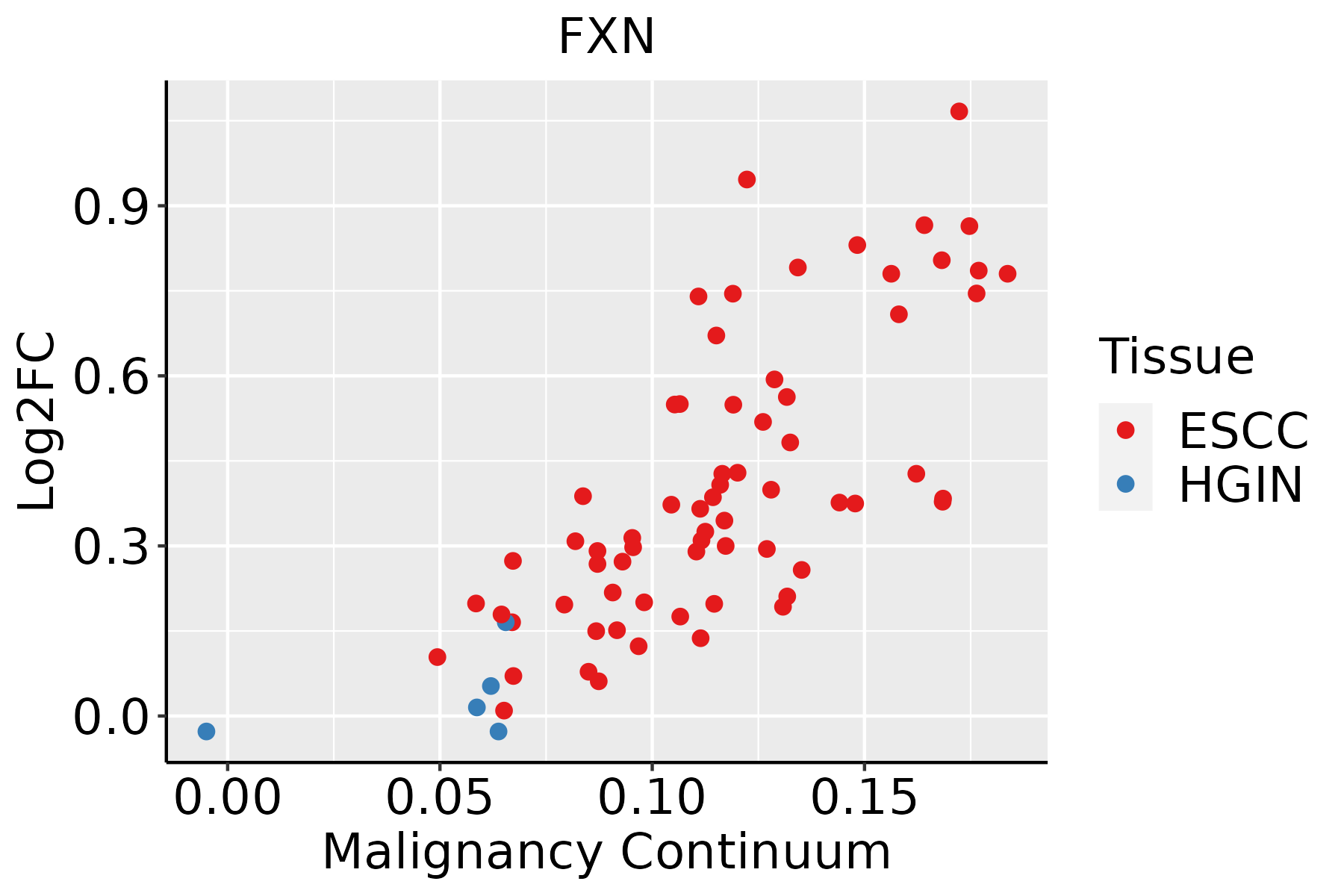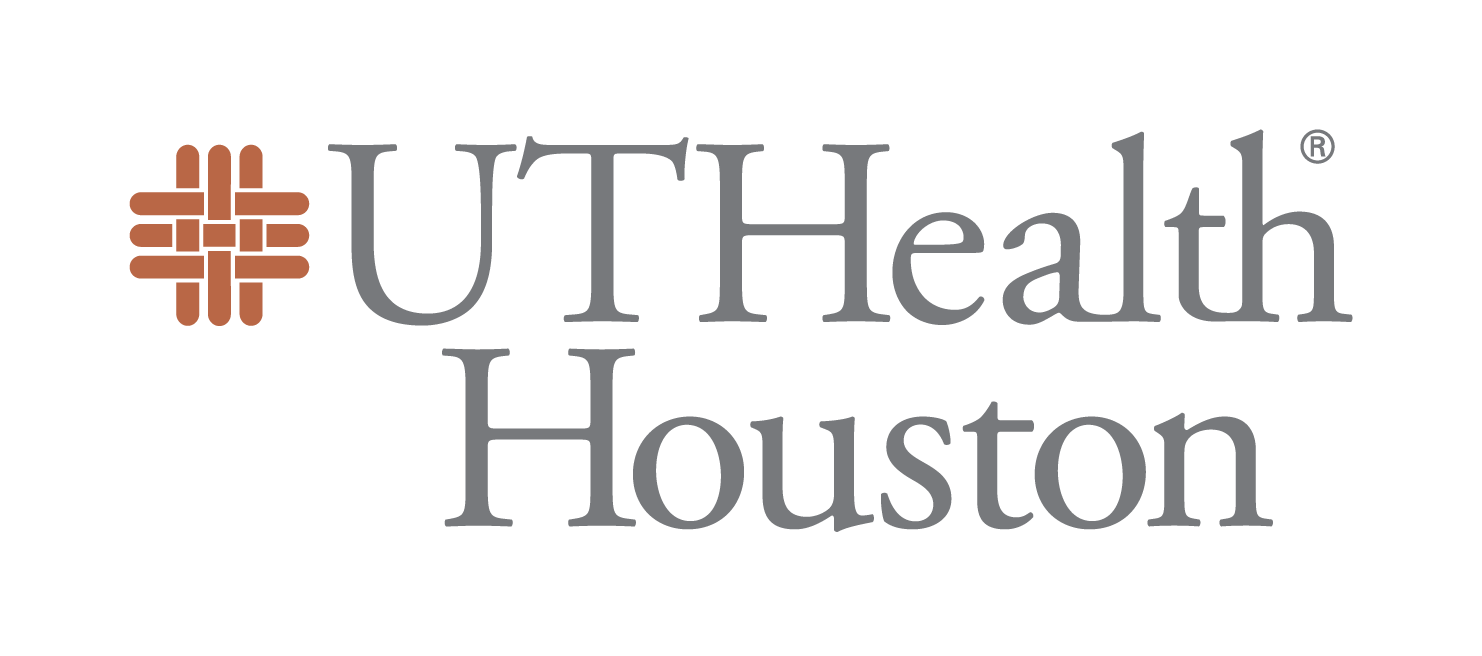
|
|||||
|
 | |
 | |
 | |
 | |
 | |
 | |
 |
Gene: FXN |
Gene summary for FXN |
| Gene information | Species | Human | Gene symbol | FXN | Gene ID | 2395 |
| Gene name | frataxin | |
| Gene Alias | CyaY | |
| Cytomap | 9q21.11 | |
| Gene Type | protein-coding | GO ID | GO:0000302 | UniProtAcc | A0A0S2Z3G4 |
Top |
Malignant transformation analysis |
 Identification of the aberrant gene expression in precancerous and cancerous lesions by comparing the gene expression of stem-like cells in diseased tissues with normal stem cells Identification of the aberrant gene expression in precancerous and cancerous lesions by comparing the gene expression of stem-like cells in diseased tissues with normal stem cells |
| Entrez ID | Symbol | Replicates | Species | Organ | Tissue | Adj P-value | Log2FC | Malignancy |
| 2395 | FXN | P107T-E | Human | Esophagus | ESCC | 1.94e-59 | 1.07e+00 | 0.171 |
| 2395 | FXN | P126T-E | Human | Esophagus | ESCC | 5.94e-06 | 3.10e-01 | 0.1125 |
| 2395 | FXN | P127T-E | Human | Esophagus | ESCC | 3.49e-11 | 1.96e-01 | 0.0826 |
| 2395 | FXN | P128T-E | Human | Esophagus | ESCC | 6.46e-24 | 5.49e-01 | 0.1241 |
| 2395 | FXN | P130T-E | Human | Esophagus | ESCC | 7.02e-43 | 8.04e-01 | 0.1676 |
| 2395 | FXN | HCC1_Meng | Human | Liver | HCC | 1.60e-40 | 4.58e-02 | 0.0246 |
| 2395 | FXN | HCC1 | Human | Liver | HCC | 4.96e-12 | 2.15e+00 | 0.5336 |
| 2395 | FXN | HCC2 | Human | Liver | HCC | 6.53e-32 | 2.41e+00 | 0.5341 |
| 2395 | FXN | HCC5 | Human | Liver | HCC | 6.10e-13 | 1.34e+00 | 0.4932 |
| 2395 | FXN | Pt13.b | Human | Liver | HCC | 1.97e-12 | 2.08e-01 | 0.0251 |
| 2395 | FXN | S014 | Human | Liver | HCC | 2.79e-02 | 2.18e-01 | 0.2254 |
| 2395 | FXN | S029 | Human | Liver | HCC | 1.69e-05 | 3.05e-01 | 0.2581 |
| 2395 | FXN | C04 | Human | Oral cavity | OSCC | 1.74e-09 | 6.73e-01 | 0.2633 |
| 2395 | FXN | C21 | Human | Oral cavity | OSCC | 1.60e-17 | 7.43e-01 | 0.2678 |
| 2395 | FXN | C30 | Human | Oral cavity | OSCC | 2.68e-32 | 1.64e+00 | 0.3055 |
| 2395 | FXN | C38 | Human | Oral cavity | OSCC | 5.26e-05 | 7.86e-01 | 0.172 |
| 2395 | FXN | C43 | Human | Oral cavity | OSCC | 6.85e-11 | 2.94e-01 | 0.1704 |
| 2395 | FXN | C46 | Human | Oral cavity | OSCC | 1.98e-04 | 2.29e-01 | 0.1673 |
| 2395 | FXN | C08 | Human | Oral cavity | OSCC | 2.41e-10 | 2.68e-01 | 0.1919 |
| 2395 | FXN | LN22 | Human | Oral cavity | OSCC | 3.64e-09 | 8.50e-01 | 0.1733 |
| Page: 1 2 3 4 5 6 |
| ∗log2FC in expression of this searched gene in stem-like cells from each diseased tissue sample relative to stem-like cells in normal samples in each tissue plotted against the malignancy continuum. Samples are colored based on if they are from different disease stage. |
Top |
Malignant transformation related pathway analysis |
 Find out the enriched GO biological processes and KEGG pathways involved in transition from healthy to precancer to cancer Find out the enriched GO biological processes and KEGG pathways involved in transition from healthy to precancer to cancer |
| Tissue | Disease Stage | Enriched GO biological Processes |
| Colorectum | AD |  |
| Colorectum | SER | 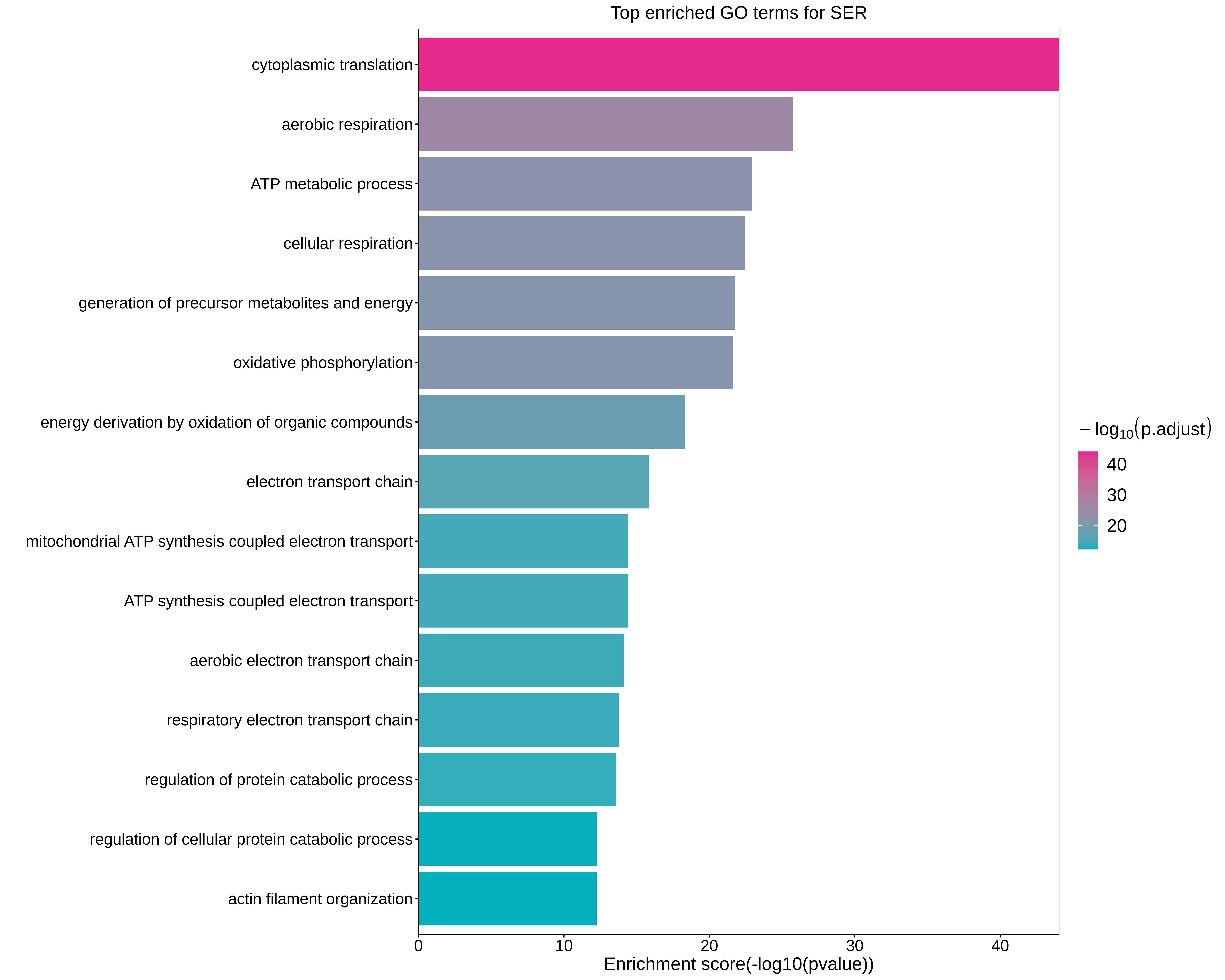 |
| Colorectum | MSS |  |
| Colorectum | MSI-H | 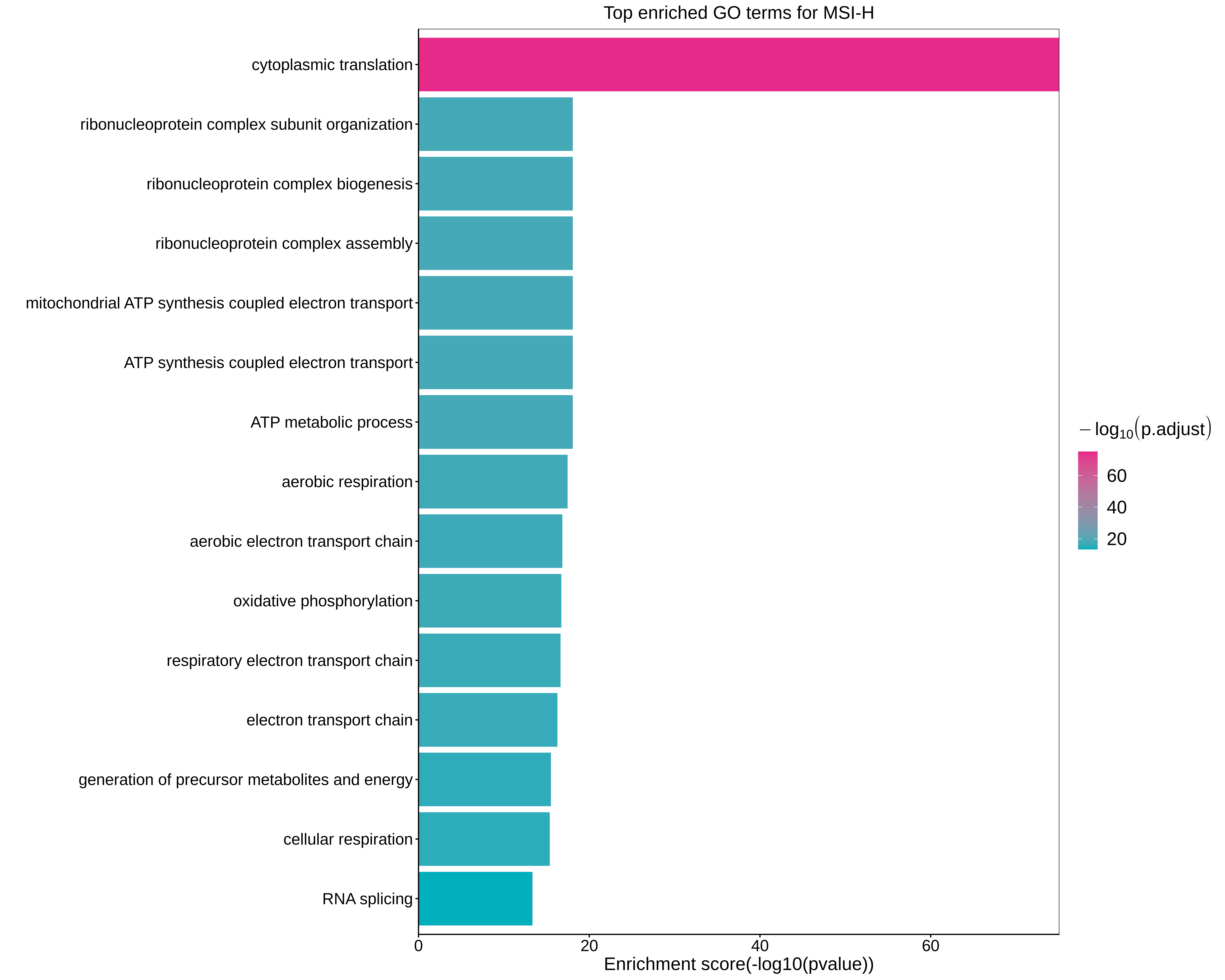 |
| Colorectum | FAP | 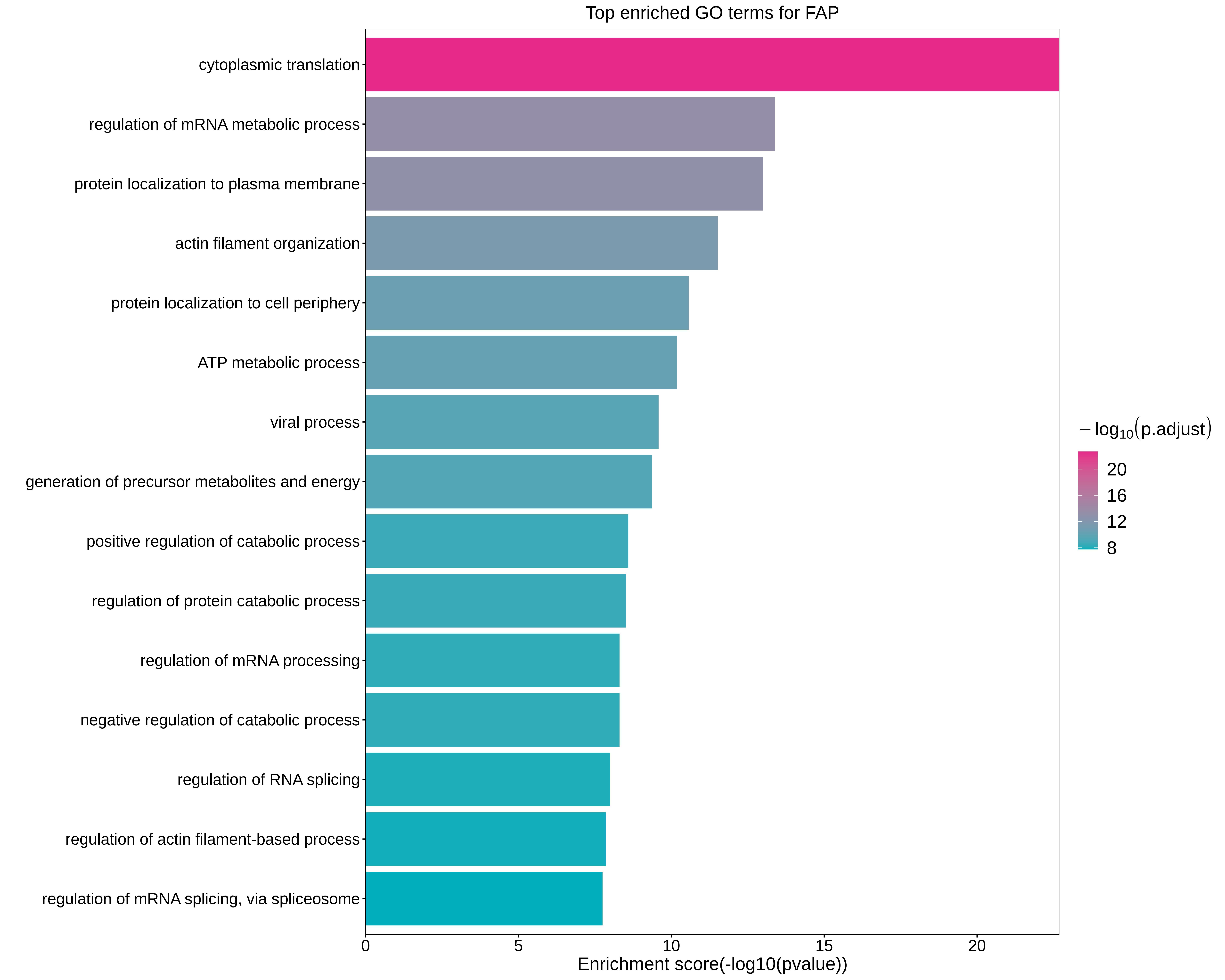 |
| ∗Top 15 enriched GO BP terms are showed in the bar plot of each disease state in each tissue. Each row represents a significant GO biological process which is colored according to the -log10(p.adjust). |
| Page: 1 2 3 4 5 6 7 8 9 |
| GO ID | Tissue | Disease Stage | Description | Gene Ratio | Bg Ratio | pvalue | p.adjust | Count |
| GO:0046034 | Colorectum | AD | ATP metabolic process | 142/3918 | 277/18723 | 2.64e-29 | 8.26e-26 | 142 |
| GO:0006091 | Colorectum | AD | generation of precursor metabolites and energy | 209/3918 | 490/18723 | 3.17e-28 | 6.61e-25 | 209 |
| GO:0009060 | Colorectum | AD | aerobic respiration | 108/3918 | 189/18723 | 9.14e-28 | 1.43e-24 | 108 |
| GO:0045333 | Colorectum | AD | cellular respiration | 119/3918 | 230/18723 | 3.21e-25 | 4.02e-22 | 119 |
| GO:0006119 | Colorectum | AD | oxidative phosphorylation | 83/3918 | 141/18723 | 7.95e-23 | 8.30e-20 | 83 |
| GO:0015980 | Colorectum | AD | energy derivation by oxidation of organic compounds | 143/3918 | 318/18723 | 2.78e-22 | 2.49e-19 | 143 |
| GO:0006839 | Colorectum | AD | mitochondrial transport | 102/3918 | 254/18723 | 1.87e-12 | 3.08e-10 | 102 |
| GO:0006979 | Colorectum | AD | response to oxidative stress | 145/3918 | 446/18723 | 5.16e-09 | 3.23e-07 | 145 |
| GO:1990542 | Colorectum | AD | mitochondrial transmembrane transport | 47/3918 | 102/18723 | 1.09e-08 | 6.52e-07 | 47 |
| GO:2001233 | Colorectum | AD | regulation of apoptotic signaling pathway | 119/3918 | 356/18723 | 2.14e-08 | 1.21e-06 | 119 |
| GO:0010639 | Colorectum | AD | negative regulation of organelle organization | 114/3918 | 348/18723 | 1.41e-07 | 6.49e-06 | 114 |
| GO:0010821 | Colorectum | AD | regulation of mitochondrion organization | 57/3918 | 144/18723 | 2.43e-07 | 9.92e-06 | 57 |
| GO:0062197 | Colorectum | AD | cellular response to chemical stress | 109/3918 | 337/18723 | 5.33e-07 | 1.95e-05 | 109 |
| GO:0000302 | Colorectum | AD | response to reactive oxygen species | 78/3918 | 222/18723 | 6.17e-07 | 2.21e-05 | 78 |
| GO:0055076 | Colorectum | AD | transition metal ion homeostasis | 53/3918 | 138/18723 | 1.89e-06 | 5.65e-05 | 53 |
| GO:0034599 | Colorectum | AD | cellular response to oxidative stress | 94/3918 | 288/18723 | 2.03e-06 | 6.02e-05 | 94 |
| GO:0016049 | Colorectum | AD | cell growth | 143/3918 | 482/18723 | 2.83e-06 | 8.09e-05 | 143 |
| GO:0001558 | Colorectum | AD | regulation of cell growth | 124/3918 | 414/18723 | 7.67e-06 | 1.86e-04 | 124 |
| GO:0008637 | Colorectum | AD | apoptotic mitochondrial changes | 42/3918 | 107/18723 | 1.13e-05 | 2.56e-04 | 42 |
| GO:2001234 | Colorectum | AD | negative regulation of apoptotic signaling pathway | 74/3918 | 224/18723 | 1.49e-05 | 3.18e-04 | 74 |
| Page: 1 2 3 4 5 6 7 8 9 10 11 12 13 14 15 |
| Pathway ID | Tissue | Disease Stage | Description | Gene Ratio | Bg Ratio | pvalue | p.adjust | qvalue | Count |
| Page: 1 |
Top |
Cell-cell communication analysis |
 Identification of potential cell-cell interactions between two cell types and their ligand-receptor pairs for different disease states Identification of potential cell-cell interactions between two cell types and their ligand-receptor pairs for different disease states |
| Ligand | Receptor | LRpair | Pathway | Tissue | Disease Stage |
| Page: 1 |
Top |
Single-cell gene regulatory network inference analysis |
 Find out the significant the regulons (TFs) and the target genes of each regulon across cell types for different disease states Find out the significant the regulons (TFs) and the target genes of each regulon across cell types for different disease states |
| TF | Cell Type | Tissue | Disease Stage | Target Gene | RSS | Regulon Activity |
| ∗The dot plots of a searched regulon are shown for all cell subpopulations in each disease state of each tissue based on the regulon specific score inferred using pySCENIC and by calculating the average expression. |
| Page: 1 |
Top |
Somatic mutation of malignant transformation related genes |
 Annotation of somatic variants for genes involved in malignant transformation Annotation of somatic variants for genes involved in malignant transformation |
| Hugo Symbol | Variant Class | Variant Classification | dbSNP RS | HGVSc | HGVSp | HGVSp Short | SWISSPROT | BIOTYPE | SIFT | PolyPhen | Tumor Sample Barcode | Tissue | Histology | Sex | Age | Stage | Therapy Types | Drugs | Outcome |
| FXN | SNV | Missense_Mutation | novel | c.485G>A | p.Gly162Glu | p.G162E | Q16595 | protein_coding | deleterious(0.02) | probably_damaging(1) | TCGA-C8-A26X-01 | Breast | breast invasive carcinoma | Female | <65 | I/II | Chemotherapy | 5-fluorouracil | CR |
| FXN | SNV | Missense_Mutation | rs551991546 | c.446C>T | p.Thr149Met | p.T149M | Q16595 | protein_coding | deleterious(0) | probably_damaging(1) | TCGA-AA-A022-01 | Colorectum | colon adenocarcinoma | Female | >=65 | I/II | Unknown | Unknown | SD |
| FXN | SNV | Missense_Mutation | c.320N>T | p.Ala107Val | p.A107V | Q16595 | protein_coding | deleterious(0.02) | possibly_damaging(0.571) | TCGA-AY-6197-01 | Colorectum | colon adenocarcinoma | Male | <65 | I/II | Unknown | Unknown | SD | |
| FXN | SNV | Missense_Mutation | novel | c.392N>C | p.Val131Ala | p.V131A | Q16595 | protein_coding | deleterious(0.02) | probably_damaging(0.991) | TCGA-D5-6540-01 | Colorectum | colon adenocarcinoma | Male | >=65 | I/II | Unknown | Unknown | SD |
| FXN | SNV | Missense_Mutation | novel | c.470N>A | p.Ser157Tyr | p.S157Y | Q16595 | protein_coding | deleterious(0) | probably_damaging(0.999) | TCGA-A5-A0G2-01 | Endometrium | uterine corpus endometrioid carcinoma | Female | <65 | III/IV | Unknown | Unknown | SD |
| FXN | SNV | Missense_Mutation | novel | c.560N>T | p.Ala187Val | p.A187V | Q16595 | protein_coding | deleterious(0.03) | benign(0.164) | TCGA-A5-A0G2-01 | Endometrium | uterine corpus endometrioid carcinoma | Female | <65 | III/IV | Unknown | Unknown | SD |
| FXN | SNV | Missense_Mutation | novel | c.242N>A | p.Ser81Tyr | p.S81Y | Q16595 | protein_coding | deleterious(0) | benign(0.133) | TCGA-A5-A2K5-01 | Endometrium | uterine corpus endometrioid carcinoma | Female | >=65 | I/II | Unknown | Unknown | SD |
| FXN | SNV | Missense_Mutation | novel | c.502N>C | p.Trp168Arg | p.W168R | Q16595 | protein_coding | deleterious(0.02) | benign(0.11) | TCGA-AP-A054-01 | Endometrium | uterine corpus endometrioid carcinoma | Female | <65 | III/IV | Chemotherapy | carboplatin | PD |
| FXN | SNV | Missense_Mutation | c.482G>T | p.Ser161Ile | p.S161I | Q16595 | protein_coding | deleterious(0) | probably_damaging(0.979) | TCGA-B5-A11Y-01 | Endometrium | uterine corpus endometrioid carcinoma | Female | <65 | I/II | Unknown | Unknown | SD | |
| FXN | SNV | Missense_Mutation | c.327T>A | p.Phe109Leu | p.F109L | Q16595 | protein_coding | deleterious(0.04) | possibly_damaging(0.758) | TCGA-D1-A17Q-01 | Endometrium | uterine corpus endometrioid carcinoma | Female | <65 | I/II | Unknown | Unknown | SD |
| Page: 1 2 |
Top |
Related drugs of malignant transformation related genes |
 Identification of chemicals and drugs interact with genes involved in malignant transfromation Identification of chemicals and drugs interact with genes involved in malignant transfromation |
| (DGIdb 4.0) |
| Entrez ID | Symbol | Category | Interaction Types | Drug Claim Name | Drug Name | PMIDs |
| 2395 | FXN | TRANSPORTER, ENZYME | CISPLATIN | CISPLATIN | 12928720 | |
| 2395 | FXN | TRANSPORTER, ENZYME | ERYTHROPOIETIN | EPOETIN BETA | 16269021 |
| Page: 1 |


